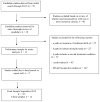The technical hypothesis of motivational interviewing: a meta-analysis of MI's key causal model
- PMID: 24841862
- PMCID: PMC4237697
- DOI: 10.1037/a0036833
The technical hypothesis of motivational interviewing: a meta-analysis of MI's key causal model
Abstract
Objective: The technical hypothesis of motivational interviewing (MI) posits that therapist-implemented MI skills are related to client speech regarding behavior change and that client speech predicts client outcome. The current meta-analysis is the first aggregate test of this proposed causal model.
Method: A systematic literature review, using stringent inclusion criteria, identified 16 reports describing 12 primary studies. We used review methods to calculate the inverse-variance-weighted pooled correlation coefficient for the therapist-to-client and the client-to-outcome paths across multiple targeted behaviors (i.e., alcohol or illicit drug use, other addictive behaviors).
Results: Therapist MI-consistent skills were correlated with more client language in favor of behavior change (i.e., change talk; r = .26, p < .0001), but not less client language against behavior change (i.e., sustain talk; r = .10, p = .09). MI-inconsistent skills were associated with less change talk (r = -.17, p = .001) as well as more sustain talk (r = .07, p = .009). Among these studies, client change talk was not associated with follow-up outcome (r = .06, p = .41), but sustain talk was associated with worse outcome (r = -.24, p = .001). In addition, studies examining composite client language (e.g., an average of negative and positive statements) showed an overall positive relationship with client behavior change (r = .12, p = .006; k = 6).
Conclusions: This meta-analysis provides an initial test and partial support for a key causal model of MI efficacy. Recommendations for MI practitioners, clinical supervisors, and process researchers are provided.
Conflict of interest statement
There are no conflicts of interest associated with this manuscript.
Figures


References
-
- Amrhein PC. How does motivational interviewing work? What client talk reveals. Journal of Cognitive Psychotherapy. 2004;18(4):323–336. doi: 10.1891/jcop.18.4.323.64001. - DOI
-
- Amrhein PC, Miller WR, Yahne C, Palmer M, Fulcher L. Client commitment language during motivational interviewing predicts drug use outcomes. Journal of Consulting and Clinical Psychology. 2003;71(5):862–878. - PubMed
-
- Arkowitz H, Miller WR, Westra HA, Rollnick S. Motivational Interviewing in the treatment of psychological problems: Conclusions and future directions. In: Arkowitz H, Westra HA, Miller WR, Rollnick S, editors. Motivational Interviewing in the Treatment of Psychological Problems. Ch 13. Guilford; New York: 2008. pp. 324–41.
Publication types
MeSH terms
Grants and funding
LinkOut - more resources
Full Text Sources
Other Literature Sources
Medical

